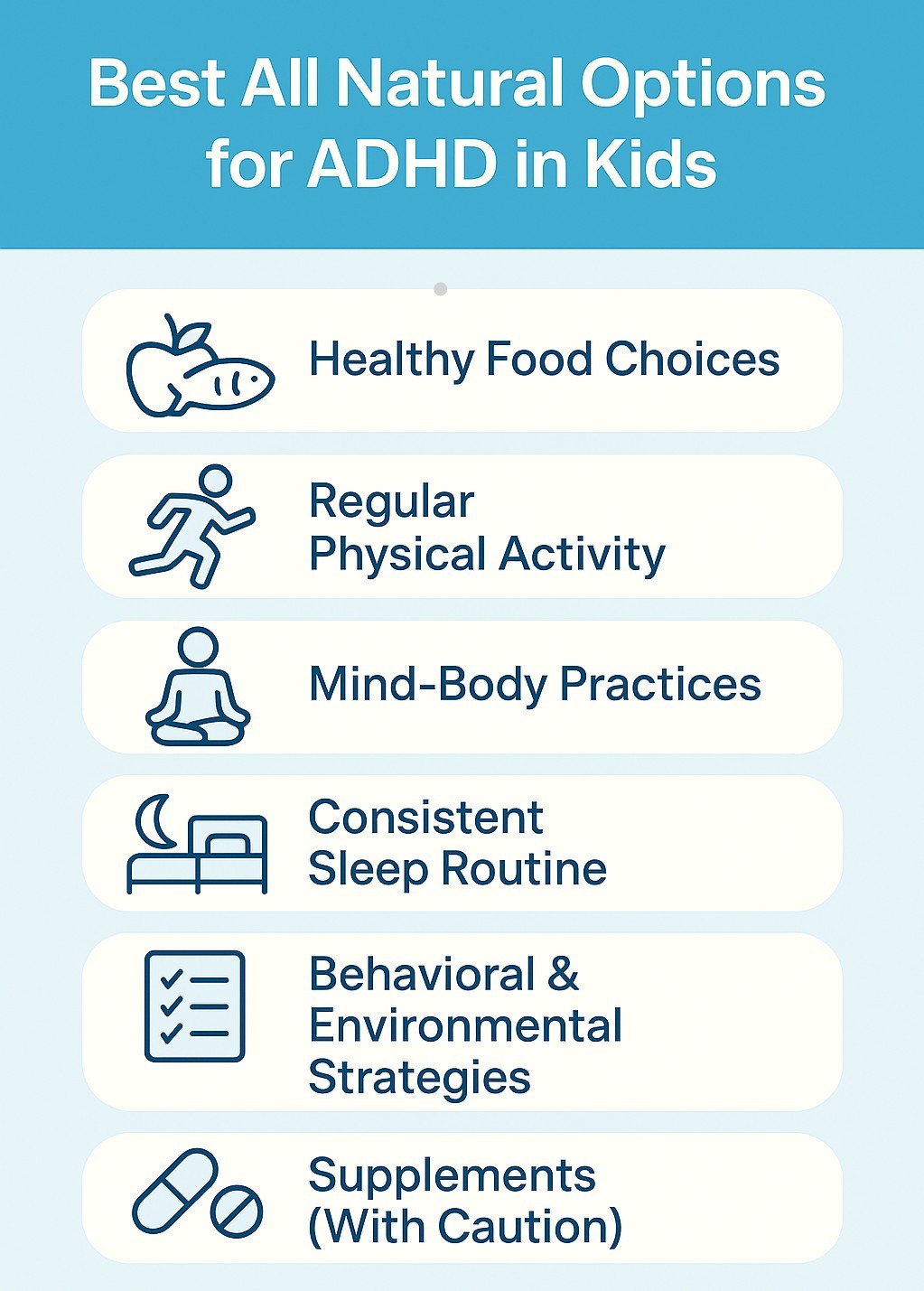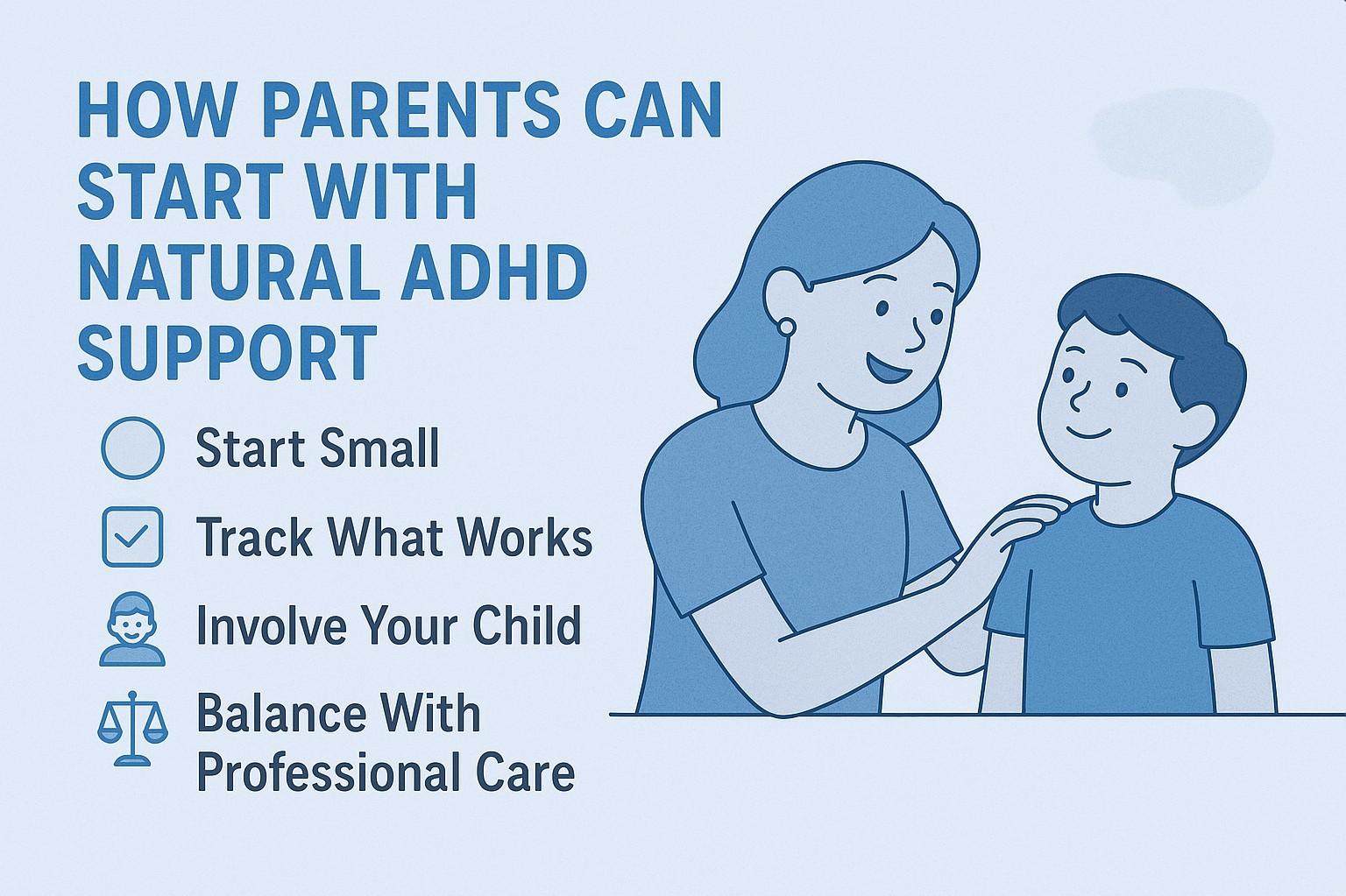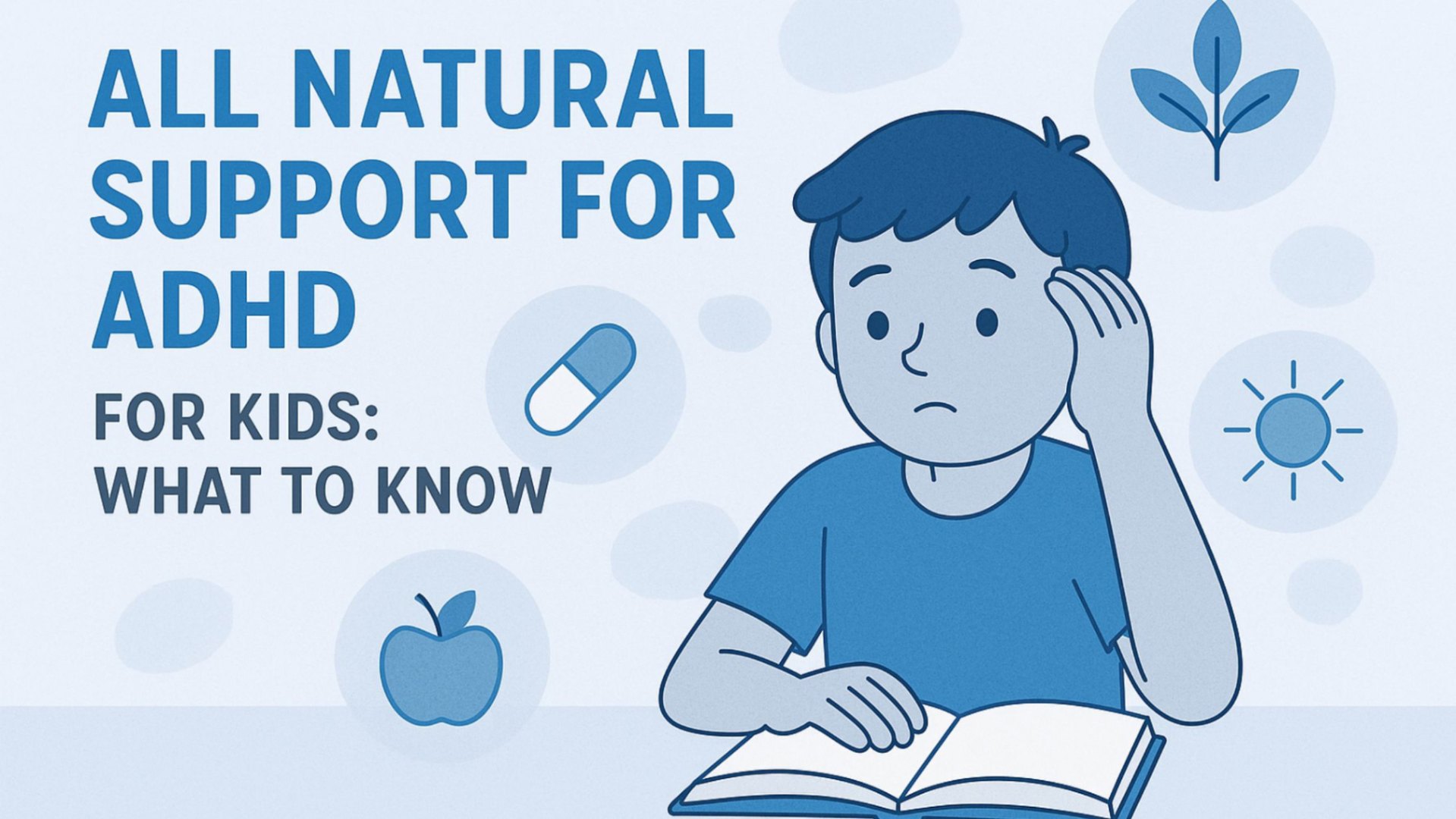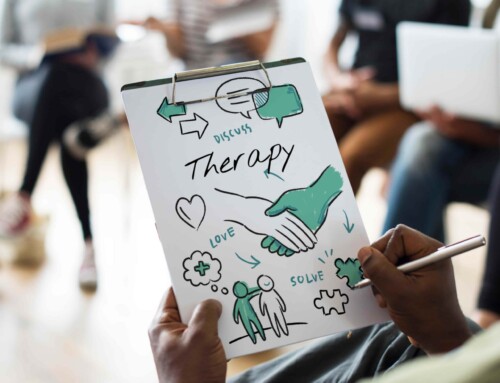All Natural Support For ADHD For Kids: What To Know?
TL;DR
|
|---|
Parenting a child with Attention Deficit Hyperactivity Disorder (ADHD) can feel overwhelming at times. One moment they’re full of energy and creativity, and the next they may be restless, distracted, or struggling to follow routines. It’s natural to wonder if this is just a phase or if your child needs extra support.
At Total Life Counseling, we often meet families with the same concerns. We walk alongside parents with clarity and reassurance, reminding them they don’t have to navigate this journey alone.
In this blog, we’ll look at what all natural support for ADHD really means and explore practical strategies like balanced diet, exercise, sleep, and mindfulness that can help kids feel more balanced and supported.
Why Parents Explore Natural Support For ADHD?
When parents hear the term “all natural support,” it’s easy to assume it means skipping professional treatment options altogether.
In truth, natural ADHD treatment for kids is not about replacing medical care but about adding healthy, everyday strategies that help children feel calmer, more focused, and more confident.
This kind of support looks at the whole child: their nutrition, sleep, activity level, environment, and emotional wellbeing. Rather than targeting a single symptom, it builds a foundation that makes daily routines easier and reduces stress for both kids and parents.
When combined with professional guidance, these natural approaches give families practical tools to make life with ADHD more manageable.
Struggling to manage your child’s ADHD symptoms at home? Book an ADHD counseling session today
Which All Natural Options Work Best for Children With ADHD?

When it comes to all natural support for ADHD, there are several approaches that can make a meaningful difference. From diet and exercise to mindfulness, structured routines, and even carefully chosen supplements, these strategies often work best in combination.
Each one helps address different aspects of ADHD, giving families a more balanced and holistic way to support their child.
Let’s start with one of the most powerful tools: healthy food choices.
1. Healthy Food Choices
Food can play a surprisingly powerful role in managing symptoms of ADHD. What your child eats affects their mood, focus, and even energy swings throughout the day.
Simple nutritional changes can help stabilize behavior and support brain health. For example, research shows that eliminating artificial colors, flavors, and preservatives, such as in the Feingold diet, can reduce hyperactive behavior for some kids.
A high-fat diet has also been linked to ADHD symptoms, making healthy food choices even more important. Don’t trust us? Watch this video for more insights.
Certain nutrients are especially important:
- Omega-3 fatty acids (found in fatty fish or fish oil) are linked to better attention and reduced impulsivity.
- Iron and zinc play a role in brain development, and deficiencies are often tied to more severe ADHD symptoms.
Here are a few practical ways to adjust your child’s diet:
- Increase Omega-3s: Add salmon, tuna, chia seeds, or a high-quality fish oil supplement.
- Avoid Additives: Cut back on foods with artificial dyes, sweeteners, or preservatives.
- Prioritize Protein: Include lean proteins (chicken, eggs, beans, nuts) in meals and snacks to balance blood sugar and support concentration.
Small, consistent changes like these can go a long way in building better focus and emotional balance for your child.
2. Regular Physical Activity
Movement is one of the most powerful natural remedies for ADHD in kids. Exercise doesn’t just burn energy, it helps release brain chemicals like dopamine and serotonin, which are key for focus, mood, and self-control.
It also boosts blood flow to the brain, bringing in the oxygen and nutrients that support sharper thinking and better concentration.
Research by he National Library of Medicine shows that aerobic exercise or perceptual motor training is beneficial to children with ADHD, helping improve attention, reduce impulsivity, and ease hyperactivity.
The best part? Even short bursts of movement make a big difference. Spending time outdoors in green spaces, such as parks or nature trails, can add an extra calming and restorative effect, making exercise even more beneficial.
Here are a few easy ways to bring more movement into your child’s routine:
- Schedule Daily Playtime: Aim for 30–60 minutes of active fun like swimming, biking, or running games.
- Embrace Nature: Plan family walks, weekend hikes, or regular visits to the park to combine exercise with the calming effects of the outdoors.
- Mix It Up: Encourage ADHD-friendly games and activities your child enjoys, such as martial arts, dancing, soccer, or even jumping on a trampoline.
Keeping exercise fun and consistent can turn it into a habit that supports focus, reduces stress, and builds confidence.
3. Mind-Body Practices
Mind-body practices are powerful, non-prescription ways to help children with ADHD strengthen focus, calm their minds, and improve self-control. These techniques encourage kids to slow down, become more aware of their thoughts and actions, and respond more thoughtfully instead of impulsively.
Here are a few simple approaches that can make a real difference in daily life:
- Mindfulness and Meditation: Simple guided meditations designed for kids can teach them how to stay in the present moment without judgment. Over time, this builds attention skills and strengthens executive functions.
- Sustained effects of neurofeedback: With the help of a trained practitioner, children can learn to regulate their own brain activity using real-time displays of brain waves. Research by the National Library of Medicine shows that this approach can lead to lasting improvements in inattention and hyperactivity.
- Working Memory Training: Games and exercises that target working memory can improve a child’s ability to hold and process information, an area many children with ADHD find challenging.
These practices are safe, empowering, and can be introduced gradually, giving kids practical tools they can use in everyday life.
4. Consistent Sleep Routine
A good night’s sleep is one of the most important foundations for managing ADHD. Research shows a clear link between poor sleep and more severe symptoms.
Lack of rest can make inattention, hyperactivity, and emotional ups and downs even harder to handle. Prioritizing sleep supports brain health and gives your child’s mind a chance to reset each night.
The Centers for Disease Control and Prevention (CDC) notes that healthy sleep habits are essential for children managing chronic conditions. For kids with ADHD, a predictable bedtime routine acts as a signal to the brain that it’s time to wind down, making it easier to fall asleep and stay asleep.
Here are a few practical ways to build a stronger sleep routine:
- Set a Consistent Bedtime: Stick to the same bedtime and wake-up time every day, including weekends.
- Create a Calming Pre-Sleep Ritual: Encourage quiet activities like reading, a warm bath, or gentle music. Avoid screens for at least an hour before bed to help the brain relax.
Even small improvements in sleep can lead to better focus, mood, and overall daily functioning for children with ADHD.
5. Behavioral & Environmental Strategies
Behavioral therapy and environmental changes are some of the most effective natural ways to treat ADHD in kids.
These methods give children the structure and consistency they need to thrive. By setting clear expectations, offering immediate feedback, and reinforcing positive behaviors, parents can help guide their child’s daily routines in a supportive way.
Consistency matters most when the whole family is involved. When parents, siblings, and caregivers follow the same approach, children receive steady and predictable messages about what is expected. Managing environmental triggers is also key.
For example, reducing video game time and limiting screen use can lessen symptoms of inattention and hyperactivity, while too much screen time is often linked with worsening symptoms.
Here are some simple strategies to try at home:
- Use a Chart for Routines: Visual schedules for morning and evening tasks make it easier for kids to stay on track.
- Set Clear and Simple Rules: Post a short list of house rules in a visible spot so expectations are always clear.
- Offer Positive Reinforcement: Praise specific actions you want to see more of, such as, “I love how you started your homework right away.”
Even small adjustments like these can create a calmer environment, reduce frustration, and set your child up for more consistent success.
6. Herbal & Nutritional Supplements (With Caution)
Many parents ask, “Which supplements are recommended for children with ADHD?” Here are some of them:
- Fish oil (omega-3s) may support attention and reduce impulsivity.
- Zinc supplements and adequate iron intake may help improve ADHD symptoms, especially when deficiencies are present.
At our center once we have an idea of which type of ADHD we can give a list of supplements to discuss with your doctor. The vitamins work in 85% of our cases.
If you are considering supplements, keep these points in mind:
- Consult a Healthcare Professional/Mental health care provider: Talk to your child’s doctor before starting anything new to make sure it is safe and appropriate.
- Start with a Low Dose: Use the smallest recommended amount and monitor your child closely for side effects or changes.
Supplements can be a helpful addition for some children, but they should always be used carefully and under professional supervision.
How Can Parents Get Started With Natural ADHD Support?

Starting a natural ADHD support plan may feel overwhelming, but it doesn’t have to be. And, feeling unsure about natural ADHD treatment for kids is common. Here’s how to start:
1. Start Small & Build Gradually
Begin with one strategy at a time and monitor its impact before adding another. For example, you might start by introducing omega-3 fatty acids (such as fish oil) into your child’s diet to support brain health. After assessing this change, you can introduce structured physical activity like biking, swimming, or organized sports to support focus and self-regulation.
Adding strategies slowly makes it easier to see what is effective and prevents your child from feeling overwhelmed.
2. Keep Track Of What Works
Children with ADHD respond differently to support strategies. To identify what helps your child, maintain a daily record. Note down meals, activities, sleep quality, and any changes in focus or behavior.
This record allows you to identify clear patterns, such as improved concentration after certain foods or calmer behavior after outdoor activity. Use this information to refine your child’s plan, keeping what helps and setting aside what does not.
3. Involve Your Child In The Process
Children are more likely to follow routines when they are part of the decision-making process. You can:
- Create a routine chart together: Allow your child to design or decorate their daily schedule.
- Offer structured choices: For example, ask if they would prefer to play soccer or go for a bike ride.
These actions promote cooperation and build a sense of responsibility in managing daily activities.
4. Balance Natural Support With Professional Care
Lifestyle changes and natural strategies are most effective when used alongside professional guidance.
Always consult your child’s healthcare provider before adding supplements or making major changes to diet, sleep, or activity. A doctor or therapist can help rule out underlying issues, monitor progress, and guide you toward safe, effective strategies that complement your child’s overall care plan.
Support from teachers and counselors in social settings such as classrooms or group activities can also reinforce consistency and help your child apply these strategies beyond the home.
Parents can join the ADHD Masterclass to learn practical tools for supporting their children.
How Total Life Counseling Can Support Your Family?
At Total Life Counseling, we understand how challenging it can feel to manage ADHD on your own. Many parents come to us unsure if their child is going through a phase or if it’s time to seek professional help.
Our licensed therapists provide clarity, reassurance, and practical strategies that truly make a difference. From natural ADHD support to structured routines and personalized therapy plans, we guide families every step of the way.
With compassionate care and proven methods, we help children build confidence while equipping parents with the tools to support their child’s growth.
Book your session with Total Life Counseling today.
Final Thoughts
Supporting a child with ADHD is not about quick fixes but about creating steady, meaningful change. Natural strategies can help build a calmer, more focused daily life, yet the true power lies in the patience, consistency, and encouragement you bring as a parent.
With every small step, you are helping your child grow into their strengths and discover their full potential.
Frequently Asked Questions
Are natural remedies effective for every child with ADHD?
Natural remedies are not a one-size-fits-all solution. Their effectiveness varies depending on the child, the specific ADHD symptoms, and the severity of ADHD symptoms. A personalized treatment plan that tracks for significant improvements is key to finding what works best for your child.
Are there risks or side effects with natural ADHD supports?
Yes, some natural support options carry risks. Herbal supplements can cause serious side effects or have significant interactions with medications. It is crucial to consult a healthcare provider about short term treatments before starting new ADHD treatment to ensure they are safe and appropriate for your child.
How can parents choose the best natural support plan for their child?
Parents can choose the best treatment plan by working with healthcare professionals and involving all family members. Start with one or two behavioral interventions, such as structured routines or working memory training, as recommended by the American Psychiatric Association, and track your child’s response to build a personalized approach for the management of ADHD.
Are there specific lifestyle habits that help kids manage ADHD symptoms naturally?
Yes. Healthy lifestyle habits like eating a balanced diet, getting regular exercise, following a consistent sleep routine, practicing mindfulness, and limiting screen time can naturally support kids in managing ADHD symptoms and improving daily focus.
Is there a natural alternative to ADHD meds?
Structured routines, mindfulness, exercise, and dietary changes (like limiting sugar and processed foods) are often explored as natural alternatives. These methods don’t replace medical care but can complement or, in some cases, reduce reliance on medication.
What are some natural supplements for focus?
Omega-3 fatty acids, zinc, magnesium, iron, and vitamin D are commonly studied supplements for focus and attention. While some show promise, effectiveness varies, and it’s best to consult a healthcare professional before starting any regimen.
What helped your ADHD kid the most?
Consistent exercise, predictable routines, and positive reinforcement made the biggest impact. Combining physical activity with structured daily habits improved focus, reduced stress, and gave our child a sense of control and accomplishment without relying only on medication.
Share This Story, Choose Your Platform!
Total Life Counseling Center consists of Licensed Counselors, masters level therapists, Español counselors, Licensed Mental Health Counselors, business coaches, and image enhancement coaches who provide counseling for emotional, mental, physical and spiritual care including marriage, individual, family, substance abuse and more. TLC’s family, trauma and marriage experts have been interviewed on National and Local TV/Radio over 200 times for their expert advice on Fox News, OWN, WETV, ABC’s Medical Minute and more. Our skilled counselors are relational, approachable and specialists providing therapy services in the Central Florida area including: Orlando, Winter Park, MetroWest, Windermere, Dr. Phillips, East Orlando, Lake Mary, and Clermont, Boca Raton Florida, and Dallas, TX.






